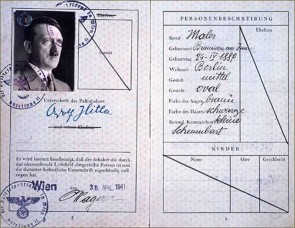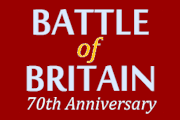Libya. Rommel’s attack at Tobruk peters out as early morning fog confuses both sides. At 7.15 AM, Panzers move forward but stumble into a newly-laid minefield where they are pinned down by 2-pounder anti-tank guns (12 tanks immobilised). British tanks and artillery are sent in to contain the breach (2 Matilda and 2 Cruiser tanks destroyed). In the evening, counterattack by Australian 2/48th Battalion is repelled with heavy casualties. Rommel had expected to take the town of Tobruk. Instead, he has a salient 2 km deep and 3 km wide, won at heavy cost (1240 casualties, only 35 out of 81 Panzers serviceable with 12 destroyed). RAF bombs Benghazi sinking an Italian freighter. British submarine HMS Upholder sinks freighters Arcturus and Leverkusen (in an empty Afrika Korps convoy returning from Tripoli) near the Tunisian island of Kerkenah.
You are currently browsing the monthly archive for April 2011.
Iraq. Overnight, 6,000 Iraqi troops with 30 artillery pieces leave Baghdad on a ‘training exercise’. By dawn, they occupy a plateau overlooking RAF airbase at Habbaniya (45 miles West of Baghdad). Rashid Ali expects the arrival of German aircraft and airborne troops but he will be disappointed. RAF Habbaniya is reinforced with 300 men of 1st Battalion King’s Own Royal Regiment flown from RAF Shaibah. British Ambassador, Sir Kinahan Cornwallis, warns British civilians to leave Baghdad (230 escorted by road to Habbaniya and then airlifted to Shaibah, 350 take refuge in the British Embassy and 150 in the American Legation).
Allied resistance on mainland Greece effectively ends at 5.30 AM when 8000 British, ANZAC, Greek and Yugoslav troops surrender at Kalamata, Peloponnese peninsula. The evacuation is over, although men will be collected from various small Greek islands over the next few days. Germans take 6508 British, 2030 Australian, 1614 New Zealand prisoners, plus 3806 Cypriots and Palestinians. Allied support of the British government commitments to Greece (executed mainly by NZ and Australian troops) has cost 2250 killed and wounded and 14,000 taken prisoner (out of 58,000 sent to Greece). In addition, 104 tanks, 192 field guns, 164 anti-tank guns, 40 anti-aircraft guns, 1812 machine guns, 8000 trucks are lost plus 209 aircraft destroyed (72 lost during the combat phase, 55 bombed on the ground by Luftwaffe, 82 destroyed or abandoned during the evacuation). Germany has overrun Greece in 23 days with 1318 killed and 3360 wounded (plus 166 killed and 392 wounded in Yugoslavia). In contrast, the Greco-Italian war in Northern Greece and Southern Albania (which was ended by the German invasion) costs Greece and Italy each about 14000 killed with 60,000 wounded. Most British troopships crowding Suda Bay, Crete, are sent on to Alexandria, Egypt, avoid attack by Luftwaffe bombers which sink 2 Greek steamers.
Churchill’s speech last night very good, as a speech. But impossible to dig any information out of it. The sole solid fact I could extract was that at the time of his offensive in Libya Wavell could never concentrate more than 2 divisions, say 30,000 men. Heard the speech at the Home Guard post. The men impressed by it, in fact moved. But I think only two of the ones there were men below the £5-a-week level. Churchill’s oratory is really good, in an old-fashioned way, though I don’t like his delivery. What a pity that he either can’t, or doesn’t want, or isn’t allowed ever to say anything definite!
Greece. During the day, German bombing sinks Greek torpedo boat Kyzikos and 2 steamers. Overnight, 4170 Allied troops are evacuated from the Peloponnese peninsula. 2 German companies (5th Panzer Division) drive into the port of Kalamata and capture the quay as the evacuation begins. Royal Navy warships sail back to sea, having embarked only 322 men. Most Allied troops are too exhausted to resist but there are several independent small group actions. Sergeant Jack Hinton of 2nd New Zealand Division wins the Victoria Cross for leading an attack to retake the quay, clearing out 3 machine-gun nests and a mortar with grenades and capturing a 6 inch gun. He is shot in the stomach and taken prisoner (he will receive his medal from King George at Buckingham Palace on May 11 1945, after his release). Allied forces recapture the quay (41 Germans killed, 60 wounded, 100 taken prisoner) but it is too late, the warships are gone.
Greece. Dutch liner SS Slamat leaves Nauplia harbour with 211 crew and 500 Allied troops at 4 AM, too late to escape an attack by 9 Stukas at 7 AM. British destroyers HMS Diamond and HMS Wryneck are sunk by more Stukas while rescuing survivors. Of 983 on board SS Slamat, HMS Diamond and HMS Wryneck, only 66 survive. 2nd Panzer Division motorcycle troops enter Athens and hoist the Nazi flag over the Acropolis. However, 4200 troops including British 1st Armoured Brigade are evacuated from beaches South of Athens. All day, 5th Panzer Division crosses the Corinth Canal and, at 5.30 PM, Leibstandarte SS Adolf Hitler Regiment crosses onto the Peloponnese peninsula at Patras. Allied troops evacuate from the Peloponnese to Crete by boat but Greek Cretan 5th Division are left behind, trying to return home for the defense of their island. German bombing sinks 5 steamers.
Greece. With Germans advancing on Athens and Luftwaffe attacks on mainland evacuation beaches, most Allied troops have been sent across the Corinth Canal Bridge to evacuate from the safety of the Peloponnese peninsula. Just after dawn, German paratroops land on both sides of the bridge which is quickly blown up by Allied demolition charges (killing several German troops) but German engineers have a crossing operational by the end of the day. British 1st Armoured Brigade and New Zealand 4th Brigade are trapped on the mainland, turn around and march back to beaches South of Athens where 8300 are evacuated overnight. Another 12,950 men are evacuated from the Peloponnese peninsula. Destroyer HMS Defender evacuates the crown jewels of Yugoslavia. Luftwaffe relentlessly attacks the embarkation ports and ships at sea sinking Greek torpedo boat Kydonia and 3 steamers.
C, of my section of the Home Guard, a poulterer by trade but at present dealing in meat of all kinds, yesterday bought 20 zebras which are being sold off by the Zoo. Only for dog meat, presumably, not human consumption. [1] It seems rather a waste…There are said to be still 2,000 racehorses in England, each of which will be eating 10-15 lb. of grain a day. I.e. these brutes are devouring every day the equivalent of the bread ration of a division of troops.
Greece. Allied rearguard forces from Thermopylae cover 100 miles in 12 hours and reach Athens at noon, met by cheering Greek crowds throwing flowers in gratitude for the Allied effort. However, British Legation and other foreign diplomats prepare to leave by burning confidential papers. Allied evacuation (Operation Demon) continues but only 5500 troops leave from beaches South of Athens after troopship Pennland is bombed and badly damaged (4 crew lost, 347 rescued by destroyer HMS Griffin). Luftwaffe reconnaissance identifies the evacuation beaches but British will change the embarkation points using Ultra intercepts. German bombers again focus on shipping routes, sinking 6 merchant ships and a yacht. 6 Greek destroyers and 5 submarines survive to fight another day, escaping to Alexandria, Egypt. Seeing that mainland Greece is being evacuated, Hitler orders the invasion of Crete (Operation Merkur, Führer Directive 28).
No definite news from Greece. All one knows is that a Greek army, or part of a Greek army, or possibly the whole Greek army, has capitulated. No indication as to how many men we have there, what sort of position they are left in, whether it will be possible to hang on, and if so, where etc., etc. Hints thrown out in the Daily Express suggest that we have practically no aeroplanes there. Armistice terms drawn up by the Italians evidently aim at later using Greek prisoners as hostages, with a view to blackmailing the British into giving up Crete and other islands.
Luftwaffe again mauls shipping off the Greek coast, sinking hospital ship Andros and 11 freighters. Bombers further damage British cruiser HMS York at Suda Bay, Crete. Submarine HMS Rover, moored alongside to supply electrical power for York’s anti-aircraft guns, is also damaged & out of service until March 1942. Greek torpedo boats Aigli, Alkyoni and Arethousa are scuttled to prevent capture. At 7 PM, Greek luxury yacht Hellas is bombed at Piraeus while boarding 500 British civilians and 400 wounded Allied soldiers (500 die as Hellas catches fire and slowly rolls over). Allied rearguard at Thermopylae holds off German attacks all afternoon (destroying 15 tanks) and then withdraws at midnight. Evacuation of Allied troops begins (Operation Demon) and 13,500 troops are taken from Raphtis (South of Athens) and Nauplia (Peloponnese peninsula) overnight.
The Greeks appear to be packing up. Evidently there is going to be hell to pay in Australia. [1] So long as it merely leads to an inquest on the Greek campaign, and a general row in which the position of Australia in the Empire will be defined and perhaps the conduct of the war democratised somewhat, this is all to the good.










